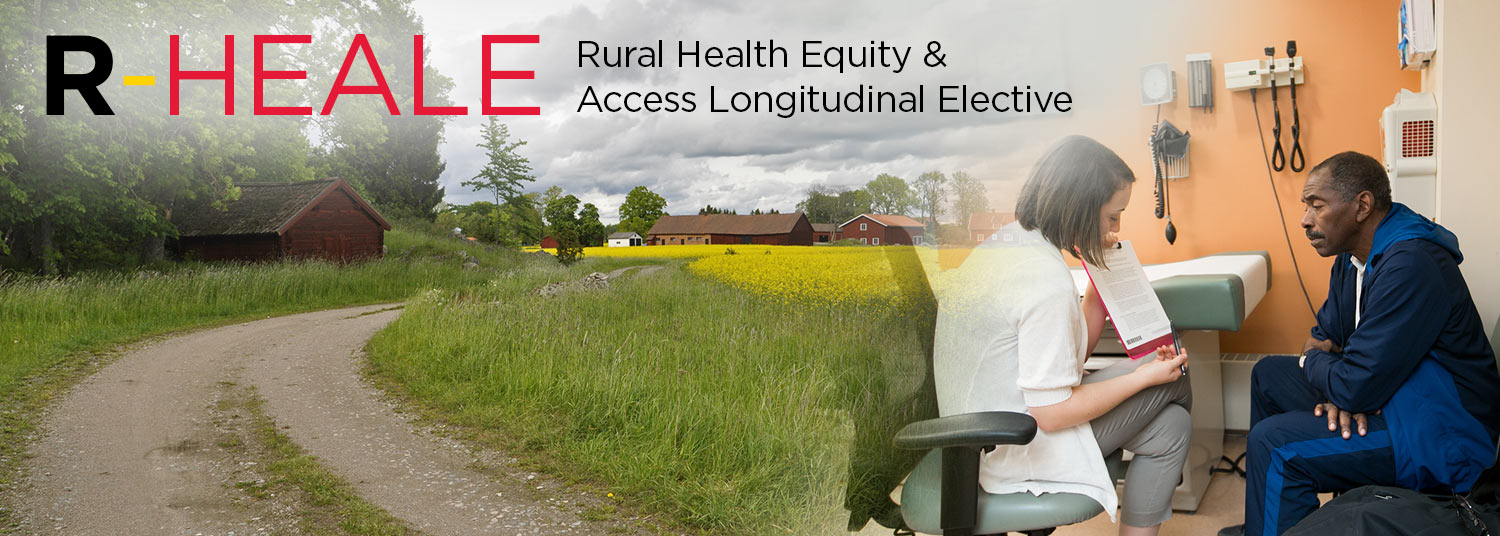About R-HEALE
 Maryland’s rural residents face challenges in accessing quality healthcare and navigating health disparities.
Maryland’s rural residents face challenges in accessing quality healthcare and navigating health disparities.
The R-HEALE program aims to educate medical students to gain a deeper understanding of rural medicine to better relate the field to their future goals and aspirations.
Goals
- Introduce students to rural patients and rural practitioners
- Gain an understanding and respect for the breadth of care for rural patients
- Participate in didactic and procedural learning sessions focused on the knowledge and skills essential for the care of rural patients
- Develop an understanding of social determinants of health specific to rural populations
- Provide longitudinal clinical experience with health care delivery in eastern Maryland
- Increase the number of UMSOM graduates who elect to practice in a rural setting
- Learn about roles of other health professionals and community resources instrumental in the care of rural patients
- Form relationships with rural health physicians who can serve as role models and provide mentorship
Training Rural Physicians
We have developed a program within our medical school curriculum in collaboration with the University of Maryland, Eastern Shore whose purpose is to train physicians who will practice in underserved areas of Maryland’s Eastern Shore.
Six to 10 students will be recruited annually who meet all the requirements for admission to our medical school and will possess additional qualities that make them uniquely qualified for the elective. A limited number of full tuition scholarships are available for students who commit to practicing on the Eastern Shore after their residency.
Qualities of ideal candidates:
-
Interest in care of the rural underserved
-
Rural background
- Intention and commitment to practice on Maryland’s Eastern Shore
Increased Access to Physicians is Essential
 Almost the entire Eastern Shore is designated by the federal government as a medically underserved area (MUA) and as a “health professional shortage area,” according to the Maryland Rural Health Association. There is a shortage of primary care providers, medical specialists, dentists, and mental health providers. The result is that some people fail to obtain all the care they need.
Almost the entire Eastern Shore is designated by the federal government as a medically underserved area (MUA) and as a “health professional shortage area,” according to the Maryland Rural Health Association. There is a shortage of primary care providers, medical specialists, dentists, and mental health providers. The result is that some people fail to obtain all the care they need.
Eight rural Eastern Shore counties have 76% of their population living in MUAs, with Caroline, Kent, Somerset and Worcester each having 100% of their populations residing in designated MUAs. Four Eastern Shore counties are among the top five in Maryland for infant and child mortality, with Somerset and Caroline counties in the top five in both age groups. Health disparities increase and access to health care decreases as Maryland’s counties become more rural. Unfortunately, with these variables also comes lower life expectancy, as much as seven years shorter in some Eastern Shore counties than in top-ranked suburban Montgomery County.
Rural Maryland represents almost 80% of Maryland’s land area and 25% of its population. Maryland recognizes 18 of its 24 jurisdictions as rural, half of which are on the Eastern Shore or West of Chesapeake Bay. All five of the state’s counties with the fewest primary care physicians per capita are on the Eastern Shore, with Caroline County having the greatest need with only one provider per 2,500 residents.
As the state’s only public medical school, the University of Maryland School of Medicine is dedicated to teaching our state’s healthcare providers of the future.
R-HEALE in the Media
Curriculum
MS1/MS2
MS1/MS2
1-hour small group sessions with simulation and clinical cases
- Introduction to R-HEALE and rural medicine in MD
- Rural physician panel discussion
- Rural health didactics
- Procedural sessions
MS3
MS3
- Clinical clerkships on Eastern Shore
- Optional participation in MS1/2 small group sessions
- Continue community research and following rural patient
MS4
MS4
- Final year project – may build on MS1/2 research project
- Clinical focus (QI), cultural focus (qualitative research), advocacy focus (policy), teaching focus (mentoring, curriculum building)
- Ambulatory rotation - Eastern Shore AHEC
- Other rural clinical opportunities as schedule allows
MS1-4
MS1-4
- Rural health physician mentorship


